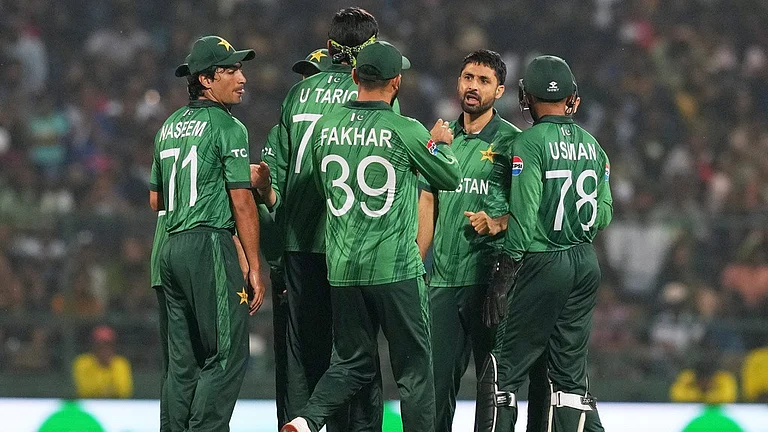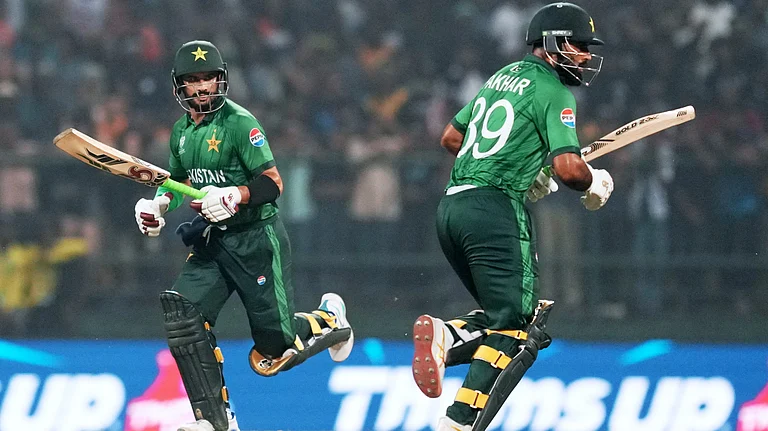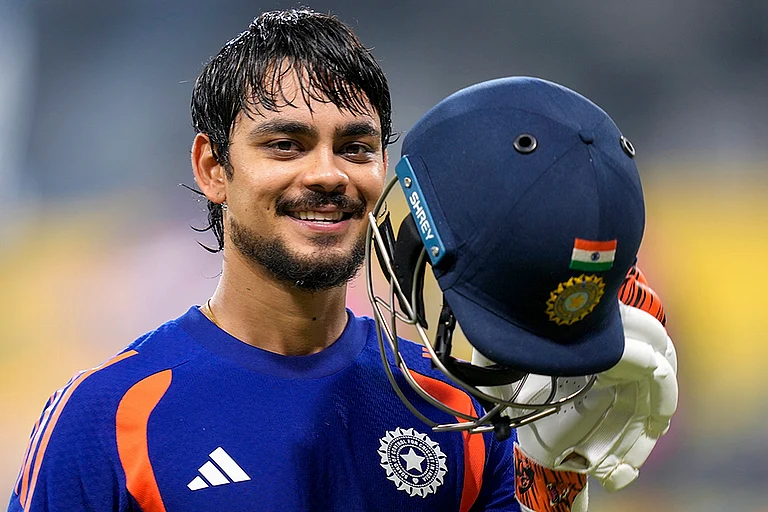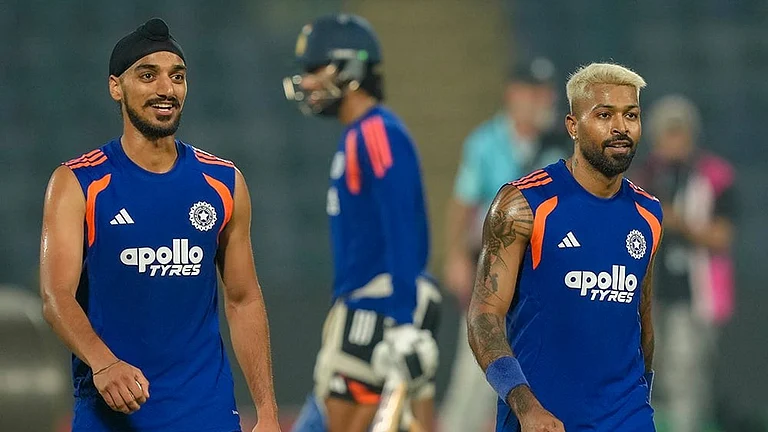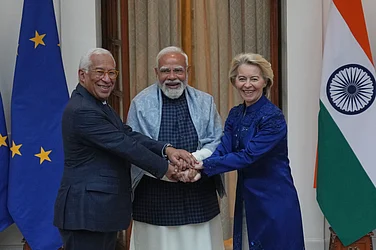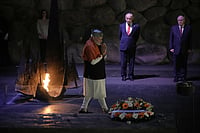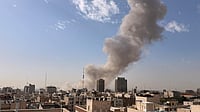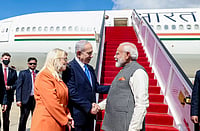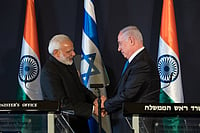There is a lot at stake for the people of Sri Lanka in Saturday’s presidential elections. For one it is the first since the economic meltdown and the spontaneous uprising in the summer of 2022, sent Gotabaya and the powerful Rajapaksa family packing.
The elections are being keenly watched not just by regional rivals India and China but also by foreign investors who have so far hesitated from putting the big bucks in the island. If the election throws up a stable government this time, the economy will recover much faster.
There are some 38 candidates in the fray but just three are actually in the race – President Ranil Wickremesinghe, leader of the opposition Sajith Premadasa and the National Peoples Power leader Anura Kumara Dissanayake. Despite being rejected by the people, the Rajapaksas have not given up. Namal Rajapaksa, son of strongman and former president Mahinda Rajapaksa is also taking a shot and is being fielded by Sri Lanka Podujana Peramuna, the family party.
The slogans of the three candidates are interesting. Dissanayake claims that the country is Anura’s and that people are with him. Premadasa’s slogan proclaims that he is the winner. In sharp contrast, Wickremesinghe’s slogan is “Sri Lanka can” and his supporters say that for Ranil country is above self.
The fresh candidate in this year’s presidential race is Janatha Vimukthi Peramuna’s Anura Kumara Dissanayake. Will voters prefer him? The JVP, an ultra-Left Sinhala Buddhist Nationalist party has now given up the armed struggle and converted into a democratic party that participates in elections as the National Peoples’ Power (NPP). The JVP had spearheaded two major violent insurrections to overthrow the democratically elected government of the day, once during Sirimavo Bandaranaike’s tenure and again in the 1980s when the United National Party (UNP) was in power. With the death of their charismatic leader Rohana Wijeweera after he was captured, tortured and killed in prison in 1989 the violent phase of the movement was over. Today, it wants to bring about change through legitimate and non-violent means.
The JVP/NPP played a major role in the people’s uprising against corruption in 2022 and is claimed to represent the workers and peasants and the rural poor Sinhala Buddhists living in the south. Realising people’s memory of the JVP as a radical outfit, Anura Dissanayake has taken great pains to project himself as a moderate leader.
Sri Lanka has been run since independence by one or the other of the traditional parties, the UNP and the Sri Lanka Freedom Party (SLFP) and the splits have led to variations of the two. Anura Dissanayake’s JVP/NPP is the outsider here. While he had been a government minister earlier under a coalition, the JVP has never ruled on its own. If he manages to win Sri Lanka will turn a page of political history. He has the support of the students, smaller trade unions and a large number of people in the rural heartland, including the youth. As a party that played a leading role in the people’s agitation and getting the Rajapaksas out of power, one would expect Dissanayake to be the front-runner. The anti-corruption movement launched against the Rajapaksas helped the NPP to get a huge following. Both Ranil Wickremesinghe and Sajith Premadasa have accommodated corrupt politicians disliked by the people. Unlike the other two candidates the NPP, which has not been in power, naturally has a clean reputation. Dissanayake appeals to all those tired of the shenanigans of the two traditional Sinhala parties. Yet Tamil minorities as well as the Muslim population are wary of Dissanayake for the JVP’s chauvinist assertion of Sinhala-Buddhist dominance in the Sinhala-majority island nation. Yet many Muslims who got the wrong end of the stick after the 2021 Easter bombings, may this time turn to Premadasa according to some of the commentary in the local media. Similarly, the Tamil minorities are divided.
This election will be a referendum on Ranil Wickremesinghe, a man from a wealthy political lineage (his uncle was president J.R.Jayawardena, his father a UNP big wig) but aloof and distant in public, who took over at a time of a major economic and political meltdown. A book lover with a collection of rare manuscripts and first-time editions, he was heartbroken when his private residence and the library were burnt down by protesters. When he became President by a twist of fate and the Rajapaksas betting on him, most thought it was only a matter of months before he would be out. But Ranil succeeded in stopping the slide; he rationalised the distribution of cooking gas and petrol, stabilising the country’s economy and gaining the confidence of the IMF and other lending agencies. He believes the electorate will see his work and give him a mandate to continue. Wickremesinghe is contesting as an Independent.
Sajith Premadasa, son of the former United National Party president, broke away from the party and Wickremesinghe’s leadership to form the Samagi Jana Balawegaya, (SJB). He and the president are both from the same ideological school with some amount of policy tweaks here and there. Sajith’s father Ranasinghe Premadasa did not come from an elite background like the rest of the UNP leaders and was a shrewd politician with his ear close to the ground. Like several other political leaders belonging to the UNP, he was allegedly killed by the Liberation Tigers of Tamil Eelan whom he had once befriended to drive out the Indian Peacekeeping Force from the island.
“Sajith Premadasa is more of a (moderately) progressive Realist than either President Wickremesinghe or the JVP-NPP leader Anura Kumara Dissanayake. He is a centrist who combines an excellent education; an upbringing with political, social and international exposure; a deep, second-generation concern for the poor and the needy; extensive experience in government and opposition, and a rare commitment to the combination of rapid economic growth and rapid socioeconomic equity. I think Sajith has a correct economic paradigm, and that’s the most important starting point,” Dayan Jayatilleke, one of the island’s foremost Left intellectuals, summarised what Premadasa brings to the table. He is certainly a Sajith backer and was even interviewed by counterpoint.org.
According to most opinion polls, no candidate is likely to cross the 50 percent-plus-one mark to be declared an outright winner.
Voters in Sri Lanka’s presidential polls mark three candidates – their first choice, second, as well as a third preference. In case there is no clear winner, the second and third ballots are counted to choose the winner. “There are wild fluctuations in voter sentiments, according to the only available opinion poll. The only outcome even halfway – and only halfway – certain is that no candidate will get 50 percent+1 in the first round,” says analyst Tissranee Gunasekara. The polls remain wide open.
“Unprecedented conjunctures can result in unprecedented outcomes. So an outright National Peoples Power victory cannot be ruled out. The problem is nothing can be ruled in or out,” she adds.
The latest polls while conceding that no candidate can cross the threshold, place Anura Dissanayake leading with 48 percent, followed by Sajith Premadasa at 25 and Ranil Wickremesinghe at 20. Unless Anura’s support surges further whoever obtains the maximum second preference votes will be a winner.
The people of Sri Lanka realise the significance of the elections and have a clear idea about their importance. The young voters want change. They are tired of the traditional political parties and are likely to give Dissanayake a chance. The older generation trusts Wickremesinghe and believes he is their best bet.








